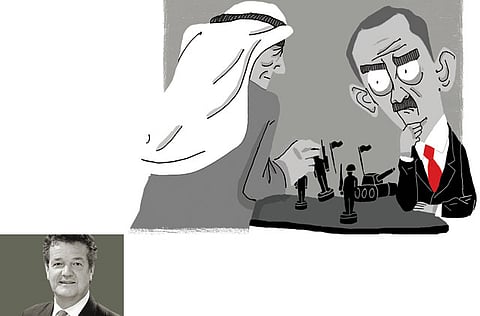Syria merits a political solution
Arab League's best option is to negotiate with Al Assad as military intervention will prove to be a logistical nightmare

It is becoming part of the regional dialogue that the Arab nations might look at sending a military force to Syria. This idea is still running as a potential back-up to the possible failure of the political track the Arab League is following, with its call for President Bashar Al Assad to step down and delegate his powers to a deputy while a national government is formed as a prelude to free presidential and parliamentary elections.
The weakness of this plan is that it needs Al Assad's agreement, which he has not offered. Meanwhile, the League has renewed the mandate for its observer mission in Syria for another month, but this mission is unlikely to get anywhere as the Syrian government appears to be able to run rings around it, and the declared purpose of the observers (which is to bring about an end to the violence) seems unlikely.
These multiple frustrations mean that the military intervention which has been suggested by the prime minister and foreign minister of Qatar and several others, remains as a possible next route for the frustrated League. But huge difficulties have to be faced before any such proposal can get anywhere near reality, both on a political and practical level.
The practical military side is very important. Any large military force needs regular daily or even hourly supplies, and fighting forces need a large range of support functions. The many square kilometres of huge camps (now standing empty) in Iraq are a monument to how much supply and support a large armed force needs.
Despite the politics behind the two recent interventions in the region, the American force in Iraq, and the Nato force in Afghanistan are two examples of the practical challenges that the League would have to cope with if it mounted its own mission in Syria. The recent Nato intervention in Libya is not a good military example since it did not include large numbers of ground forces, and the air force in action used existing Nato bases in Italy.
The League would have to establish a large central supply base in Syria, or maybe just over the border in a neighbouring country. It would also have to set up local bases all over Syria so that the forces have somewhere to sleep, regroup, and prepare for the next day's mission. There would also have to be regular flights to all these bases to supply what such a force would require.
The League would also need to find nations willing to contribute their forces, and help fund the cost of such a mission. Syria's neighbours are very unlikely to be able to stretch their forces to take on this task: the Lebanese and Jordanian armies are too small to take on such a mission, and the Iraqi army has enough to do. Therefore an Arab force would have to operate without the help of Syria's neighbours, making the logistics even more difficult.
In addition, the large Arab states with armed forces that can supply the number of soldiers that are needed to take control in Syria are all tied up with the effects of the Arab Spring. For example, it is impossible to imagine the interim Egyptian government being willing to send a large Egyptian force to Syria, and also very hard to imagine Field Marshal Tantawi being willing to accept such an order if it were made.
But the most telling challenges are not so much these insuperable practical ones, but the intractable political challenges. What would be the political aims of such a force in Syria? Since the League has been very clear that it does not support President Bashar Al Assad killing his own people by the hundreds every week, there are two options: it will either try to keep the peace, which means it will be fighting both the Syrian army and the opposition force, or it will be on the side of the opposition and will have to fight the Syrian army.
In addition, it would be very hard for a peace-keeping force to work in Syria, where the dispute is not between two geographically distinct armed forces, but between the people and the government's forces, and trouble can erupt anywhere in the country at any time.
The real problem in Syria is not the military challenge, but the continuing lack of any powerful political figure in the opposition who can offer a clear choice to the country. This compares with the lingering support for Al Assad, who has not been deserted by the military or the middle classes. It seems that he is ready to try and tough it out.
If the League is serious about its plans to achieve a change in Syria, then it needs to get Al Assad's agreement. A political route to a new Syria is far more important than any attempt to rush into a military expedition, with all its attendant difficulties.


